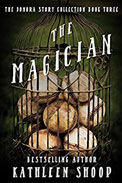
 |
2019 isn't ninety-two-year-old Patryk Rusek's year. He simply wants to die. First, his granddaughter moves him into a nursing home against his wishes. Then his plan to escape from there goes awry when his coconspiring great-grandson isn't at their rendezvous point. He learns soon afterward that he has cancer. Yet, when it seems the disease might kill him, the prospect of dying frightens him. After all, he is in Donora, a Pennsylvania mill town and his lifelong home. Patryk's family is there, as is his handwritten chronicle of baseball Hall-of-Famer and native son Stan "The Magician" Musial's early career. Patryk, "Donora's favorite casual historian," starts to worry that he'll run out of time to share with those around him the story of Musial's dazzling success.
In contrast, 1920 is the Musial family's year. In February, Mary Musial conceives her fifth child, hoping for her first boy. A midwife's prescribed fertility ritual apparently succeeds when, on November 21, Mary delivers an athletically gifted son. Stanislaw (Stan) grows up amid poverty, alcoholism, and unemployment, but he later strives to play professional baseball with the Pittsburgh Pirates. His father, Lukasz, ridicules him, wishing that he'd take a mill job instead. His scorn inspires Stan's hatred, and the two barely speak for years. Still, Stan's skill is obvious to others, who encourage him when Lukasz refuses. Will Stan's newfound self-respect, in turn, finally lead Lukasz to respect him? And can Stan fulfill the steep goal of supporting his beloved wife, Lillian, and a family as a ballplayer?
Bestselling historical fiction author Shoop, who lives in Oakmont, Pennsylvania, deftly offers up The Donora Story Collection's third installment. She consulted multiple biographies of Musial and his autobiography in her research for this novel, and her careful research shows. She also interviewed representatives of the Donora Historical Society and professors of history and English from Pennsylvania's California University. From former mill workers, she learned about daily life as such a worker. Shoop fictionalized many of the events about which she wrote and clearly notes that this is a work of historical fiction based on Musial's childhood.
As a protagonist, Stan does not always evoke much sympathy. He is often focused to the point of selfish oblivion on his goal of baseball stardom, as he fails, even when grown, to notice or care about his father's insecurities until late in the narrative. While his mother and four sisters toil in grand houses, scrubbing floors, and even his younger brother works, Stan spends the entirety of most days playing baseball. Rarely, he takes a shift at a local filling station, a circumstance that does not go unnoticed by his disgusted father, who, despite alcohol addiction and hands crippled by repeated injuries in the mill, works whatever jobs are available. Stan's stated goal is to be rich enough to afford steak dinners and, for a while, a telephone in every room of his future home.
One of the more positive aspects of the story is that Stan's mother, grandmother, sisters, and girlfriend are all assertive, self-determined women. Mary works three jobs. Stan's grandmother uncomplainingly fights cancer. His sisters do not hesitate to leave their toxic home environment as soon as possible. Additionally, Lillian refuses, in no uncertain terms, to share Stan romantically, although she does not mind sharing him as a public figure with admiring fans and the press.
Most historical fiction about sports celebrities is aimed at children, so this book is unique with its adult target audience. Shoop's prose is tender and insightful, and the true strength of the book lies in the rest of its characters, whose combined merits beautifully offset Stan's weaknesses.